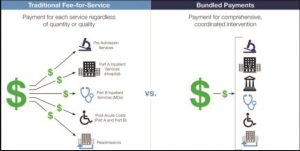
 Federal regulators may be forced to reconsider their plans to curtail a cost-containing experiment that affects some of the most commonly performed surgeries — knee and hip replacement procedures that hundreds of thousands of seniors undergo annually through their Medicare coverage at a cost to taxpayers of billions of dollars.
Federal regulators may be forced to reconsider their plans to curtail a cost-containing experiment that affects some of the most commonly performed surgeries — knee and hip replacement procedures that hundreds of thousands of seniors undergo annually through their Medicare coverage at a cost to taxpayers of billions of dollars.
Under the Affordable Care Act, doctors and hospitals were pushed to adopt a new and different way to think about and to bill for these surgeries, which, by the way, aren’t risk free. Instead of patients getting flooded with bills from each provider involved — the lab, radiologist, anesthesiologist, surgeon, hospital, and so forth — Obamacare got all the parties together and told them they would get a single, “bundled payment.” Hospitals, typically, then acted as the chief point of contact, getting the providers to figure their fair share, billing patients (once), and collecting reimbursements and distributing them appropriately.
The system seemed to work: costs declined, the quality of care went up, and patients expressed relief that their mailboxes weren’t jammed with a blizzard of the usual incomprehensible medical bills. But doctors, hospitals, and insurers kept grumbling. The Trump Administration and Republicans in Congress, as part of their relentless and counter-factual assault on the ACA (more on that in a second), took aim at bundled payments and talked about changing and eliminating this approach.
But published research has provided yet more evidence about the advantages of bundled payments, including that they don’t encourage overuse to increase profits (despite what critics claim) and they don’t cause doctors and hospitals to change their “patient mix,” cherry-picking to get more affluent customers.
If you’re a Republican politician out stumping for re-election now, it may not be the best news to hear that yet another part of Obamacare works. The ACA, including bundled payments, however, always has and still may need tweaks and repairs — not demolition.
Indeed, other research suggests that a slightly different but still bundled payment program for joint replacements, as suggested under the Trump Administration, curbed costs while also, according to Modern Healthcare, an industry news source, doing this: “[R]esearchers observed no statistically significant changes in the quality of care as measured by readmission rates, emergency department visits, and deaths.”
So, why, if the ACA works, does the GOP insist on dismembering it, including with a noteworthy legal assault under way before a conservative judge in a federal court in Texas? Go figure. Obamacare has grown in popularity, propelled in part by Americans increased knowledge about the sprawling legislation’s many benefits. Some of the very aspects of the ACA under the most ferocious attack in that action by red state attorneys general — notably protections against insurers denying health coverage based on patients’ pre-existing conditions — have become the most popular among voters, polls show.
While partisans may want to pick through the ACA and retain their favored parts (changing by the moment that years-long insistence that the whole works needed to go), such an approach, on its face, seems to undercut a key argument of the latest Obamacare assault: The Texas case argues, in effect, that Congress, when it cut out the so-called individual mandate, one element of the ACA that required Americans to show as part of their taxes that they carried health insurance, they invalidated the whole of Obamacare.
Critics have called out Republicans’ duplicity on their anti-ACA campaign.
In my practice, I see not only the harms that patients suffer while seeking medical services, but also their struggles to afford and access safe, effective, and even excellent medical care. Health insurance provides a bulwark against crushing medical debt that fast turns into bankruptcy. In a country as wealthy as ours, it’s unacceptable that we don’t share the real and constant risk of staggering medical costs by ensuring as many Americans as possible get affordable health coverage. It’s also worth noting that for most of us, especially because we get coverage at our workplace, any pay raises we’ve gotten in recent times have been wiped out by increased health care costs, especially covering our share of health insurance.
Under the ACA, the rates of the uninsured have declined and have stayed lower than in a long time, despite Trump Administration efforts to undercut Obamacare outreach and information efforts. Research is slowly emerging that the ACA has helped to improve Americans health and well-being.
Meantime, Americans have gotten an eyeful of not-good GOP notions of what might replace the ACA. And the partisans have declared that they will, if successful in the upcoming midterm elections, return to their effort to repeal it, as well as to slash at Medicare, Medicaid, and Social Security. Such steps, they say, may be necessary to deal with the national deficit’s explosion, a result of the GOP’s passage of a $1-trillion-plus tax cut for wealthy corporations and the richest Americans.
It’s worth repeating: The upcoming midterms matter. A ton. Please register and vote.